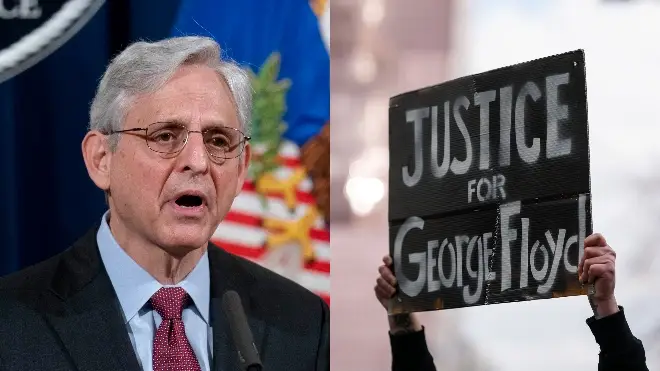
Paul Brand 10am - 12pm
21 April 2021, 15:36 | Updated: 28 April 2021, 19:20

The US Justice Department has announced an investigation into Minneapolis police practices a day after ex-officer Derek Chauvin was found guilty of murdering George Floyd.
Chauvin was found guilty of the murder and manslaughter of Mr Floyd, who was killed last May after the former policeman kneeled on his neck for more than nine minutes during an arrest.
His death sparked worldwide anti-racism protests, including Black Lives Matter (BLM) demonstrations in the UK.
Attorney General Merrick Garland said: "The Justice Department has opened a civil investigation to determine whether the Minneapolis Police Department engages in a pattern or practice of unconstitutional or unlawful policing."
He explained that the probe will be staffed by experienced attorneys, other personnel from the department's civil rights division and the US Attorney's office for the district of Minnesota.
Mr Garland added that Chauvin's verdict "does not address potentially systemic policing issues in Minneapolis".
Read more: Ohio Police fatally shoot black teenage girl minutes before Chauvin verdict
Read more: George Floyd: Former officer Derek Chauvin found guilty of murder

Derek Chauvin found guilty of the murder of George Floyd
The Justice Department is already investigating whether the officers involved violated Mr Floyd's civil rights.
Its investigation is known as a "pattern or practice" - it will be examining whether there is a pattern or practice of unconstitutional or unlawful policing.
The probe is set to be a more sweeping look into the entire department and may result in major changes to policing.
It will examine tactics used by officers and whether the department engages in discriminatory practices. The probe will also look at its handling of misconduct allegations, among other things.
However, it is unclear whether the years under investigation will begin when Mr Floyd died or before.
Read more: Floyd verdict marks 'moment of change' but 'it's not enough' - Biden
Explained: A timeline of events as Derek Chauvin is found guilty of murder

President Joe Biden speaks after George Floyd verdict
President Joe Biden has promised his administration will not rest following the jury's verdict in the case, saying much more needs to be done.
"'I can't breathe.' Those were George Floyd's last words," Mr Biden said.
"We can't let those words die with him. We have to keep hearing those words. We must not turn away. We can't turn away."
The Justice Department had considered opening a pattern or practice investigation into the police department soon after Mr Floyd's death, but then-attorney general Bill Barr was hesitant to do so at the time, fearing it could cause further divisions in law enforcement amid widespread protests and civil unrest, sources told the Associated Press.
Mr Floyd, 46, was arrested on suspicion of using a counterfeit $20 note to pay for cigarettes at a corner market.

Black James O'Brien caller: Derek Chauvin verdict was 'bittersweet'
During the arrest, he pleaded that he was claustrophobic and struggled with police as they tried to put him in a patrol car, before choosing to put him on the ground instead.
Video of the murder was caught on camera by a bystander, which showed Mr Floyd repeatedly saying "I can't breathe".
Onlookers shouted at Chauvin to stop as the officer pressed his knee on or close to the victim's neck for what authorities say was about nine-and-a-half minutes, including several minutes after Mr Floyd's breathing had stopped.
His death on 25 May became a flashpoint in the national conversation about the deaths of black Americans at the hands of law enforcement and sparked worldwide protests.
At trial, Chauvin's lawyer persistently suggested his knee was not on Floyd's neck for as long as prosecutors argued, suggesting it was across his back, shoulder blades and arm.